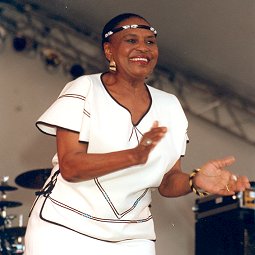| B i o g r a p h y |
 Miriam Makeba
(b. March 4, 1932) is a Grammy Award-winning South African singer, also
known as Mama Afrika. Miriam Zenzi Makeba was born in Johannesburg in
1932. Her mother was a Swazi sangoma and her father, who died when she
was six, was a Xhosa. Her professional career began in the 1950s with
the Manhattan Brothers, before she formed her own group, The Skylarks,
singing a blend of jazz and traditional melodies of South Africa. In
1959, she performed in the musical King Kong alongside Hugh Masekela,
her future husband. Though she was a successful recording artist, she
was only receiving a few dollars for each recording session and no
provisional royalties, and was keen to go to the US. Her break came
when she starred in the anti-apartheid documentary Come Back, Africa in
1959. When the Italian government invited her to the premier of the
film at the Venice Film Festival, she decided not to return home. Her
South African passport was revoked shortly afterwards. Makeba then
travelled to London where she met Harry Belafonte, who assisted her in
gaining entry to and fame in the United States. She released many of
her most famous hits there including Pata Pata, The Click Song
(Qongqothwane in Xhosa), and Malaika.
Miriam Makeba
(b. March 4, 1932) is a Grammy Award-winning South African singer, also
known as Mama Afrika. Miriam Zenzi Makeba was born in Johannesburg in
1932. Her mother was a Swazi sangoma and her father, who died when she
was six, was a Xhosa. Her professional career began in the 1950s with
the Manhattan Brothers, before she formed her own group, The Skylarks,
singing a blend of jazz and traditional melodies of South Africa. In
1959, she performed in the musical King Kong alongside Hugh Masekela,
her future husband. Though she was a successful recording artist, she
was only receiving a few dollars for each recording session and no
provisional royalties, and was keen to go to the US. Her break came
when she starred in the anti-apartheid documentary Come Back, Africa in
1959. When the Italian government invited her to the premier of the
film at the Venice Film Festival, she decided not to return home. Her
South African passport was revoked shortly afterwards. Makeba then
travelled to London where she met Harry Belafonte, who assisted her in
gaining entry to and fame in the United States. She released many of
her most famous hits there including Pata Pata, The Click Song
(Qongqothwane in Xhosa), and Malaika.
In 1966, Makeba received the Grammy Award for Best Folk Recording together with Harry Belafonte for An Evening With Belafonte/Makeba. The album dealt with the political plight of black South Africans under apartheid. In 1963, after an impassioned testimony before the United Nations Committee Against Apartheid, Makeba's records were banned in South Africa and her South African citizenship and her right to return to the country were revoked. Her marriage to Trinidadian civil rights activist and Black Panthers leader Stokely Carmichael in 1968 caused controversy in the United States, and her record deals and tours were cancelled. As a result of this, the couple moved to Guinea, where they became close with President Ahmed Sékou Touré and his wife. Makeba separated from Carmichael in 1973, and continued to perform primarily in Africa, South America and Europe. She also served as a Guinean delegate to the United Nations, for which she won the Dag Hammarskjöld Peace Prize in 1986.
After the death of her only daughter Bongi Makeba in 1985, she moved to Brussels. In 1987, she appeared in Paul Simon's Graceland tour. Shortly thereafter she published her autobiography Makeba: My Story (ISBN 0-453-00561-6). Nelson Mandela persuaded her to return to South Africa in 1990. In 1992 she starred in the film Sarafina!, about the 1976 Soweto youth uprisings, as the title character's mother, Angelina. She also took part in the 2002 documentary Amandla!: A Revolution in Four-Part Harmony where she and others recalled the days of Apartheid. In 2001 she was awarded the Gold Otto Hahn Peace Medal by the United Nations Association of Germany (DGVN) in Berlin, "for outstanding services to peace and international understanding". In 2002, she shared the Polar Music Prize with Sofia Gubaidulina. In 2004, Makeba was voted 38th in the Top 100 Great South Africans. Makeba started a 14 month worldwide farewell tour in 2005, holding concerts in all of those countries that she had visited during her working life.